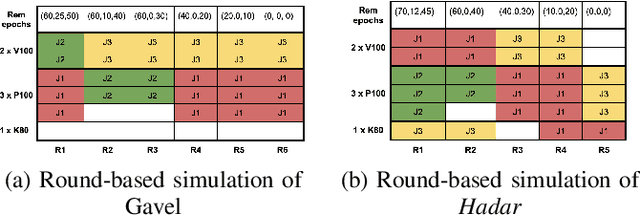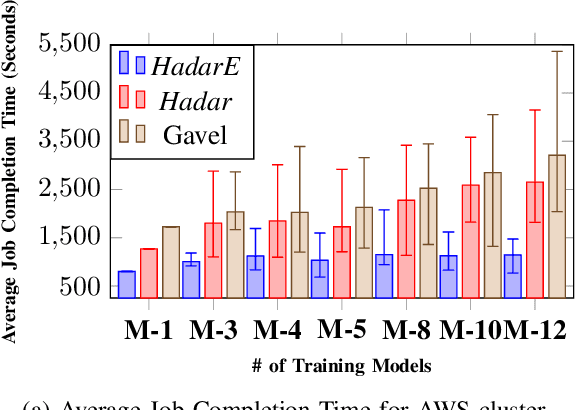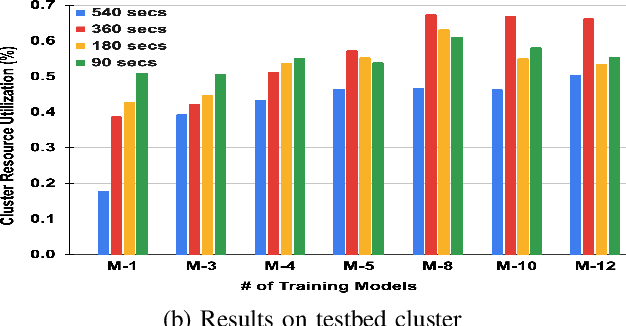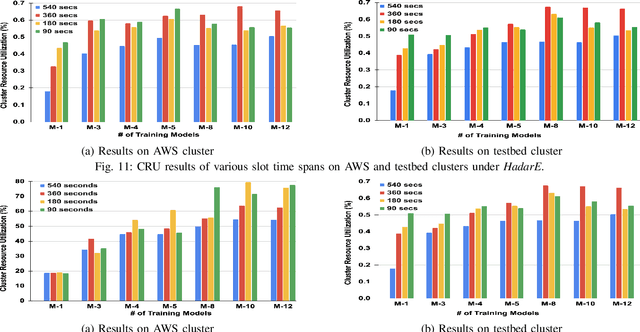Nabin Pakka
Resource Heterogeneity-Aware and Utilization-Enhanced Scheduling for Deep Learning Clusters
Mar 13, 2025



Abstract:Scheduling deep learning (DL) models to train on powerful clusters with accelerators like GPUs and TPUs, presently falls short, either lacking fine-grained heterogeneity awareness or leaving resources substantially under-utilized. To fill this gap, we propose a novel design of a task-level heterogeneity-aware scheduler, {\em Hadar}, based on an optimization framework that can boost resource utilization. {\em Hadar} leverages the performance traits of DL jobs on a heterogeneous DL cluster, characterizes the task-level performance heterogeneity in the optimization problem, and makes scheduling decisions across both spatial and temporal dimensions. %with the objective to reduce the average job completion time of DL jobs. It involves the primal-dual framework employing a dual subroutine, to solve the optimization problem and guide the scheduling design. Our trace-driven simulation with representative DL model training workloads demonstrates that {\em Hadar} accelerates the total time duration by 1.20$\times$ when compared with its state-of-the-art heterogeneity-aware counterpart, Gavel. Further, our {\em Hadar} scheduler is enhanced to {\em HadarE} by forking each job into multiple copies to let a job train concurrently on heterogeneous GPUs resided on separate available nodes (i.e., machines or servers) for resource utilization enhancement. {\em HadarE} is evaluated extensively on physical DL clusters for comparison with {\em Hadar} and Gavel. With substantial enhancement in cluster resource utilization (by 1.45$\times$), {\em HadarE} exhibits considerable speed-ups in DL model training, reducing the total time duration by 50\% (or 80\%) on an Amazon's AWS (or our lab) cluster, while producing trained DL models with consistently better inference quality than those trained by \textit{Hadar}.
Knowledge Bases in Support of Large Language Models for Processing Web News
Nov 14, 2024



Abstract:Large Language Models (LLMs) have received considerable interest in wide applications lately. During pre-training via massive datasets, such a model implicitly memorizes the factual knowledge of trained datasets in its hidden parameters. However, knowledge held implicitly in parameters often makes its use by downstream applications ineffective due to the lack of common-sense reasoning. In this article, we introduce a general framework that permits to build knowledge bases with an aid of LLMs, tailored for processing Web news. The framework applies a rule-based News Information Extractor (NewsIE) to news items for extracting their relational tuples, referred to as knowledge bases, which are then graph-convoluted with the implicit knowledge facts of news items obtained by LLMs, for their classification. It involves two lightweight components: 1) NewsIE: for extracting the structural information of every news item, in the form of relational tuples; 2) BERTGraph: for graph convoluting the implicit knowledge facts with relational tuples extracted by NewsIE. We have evaluated our framework under different news-related datasets for news category classification, with promising experimental results.
 Add to Chrome
Add to Chrome Add to Firefox
Add to Firefox Add to Edge
Add to Edge